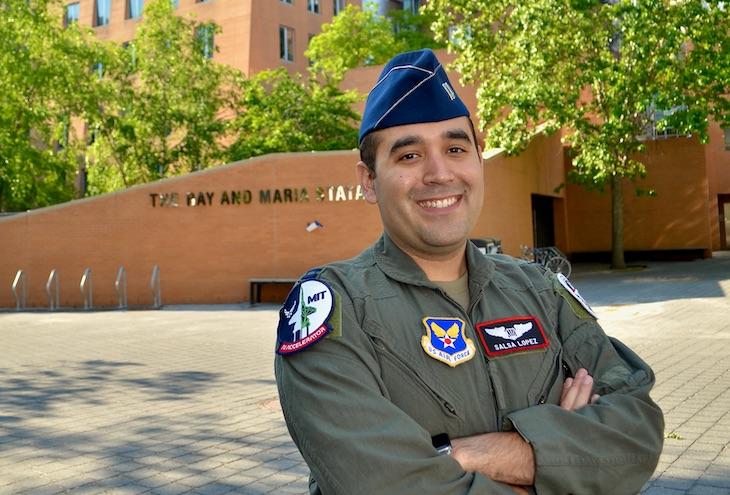When Victor “SALSA” Lopez was a high school junior in Houston, he had two competing summer internships to consider. One was a NASA Pathways Internship at the Goddard Space Flight Center in Maryland. The other was helping to produce a video for an emerging local rapper. At age 16, Lopez was all about the video shoot. But the project fell apart, and fortunately, NASA was still an option. At Goddard he worked on research trying to predict landslides and earthquakes — an experience that fundamentally shifted his future path. He realized that while studying math and science may not always be fun, STEM studies can help save lives.
Lopez became enthralled with space. He thought the best major for him would be aerospace engineering, and the best place for that would be the Air Force Academy. This would mean a huge geographic move. Lopez is a proud Tejano — a sixth-generation Texan with Native American and Spanish ancestry. His family has lived in Texas since it was a Spanish colony, then part of Mexico, then the independent Republic of Texas, finally joining the Union in 1845. When Lopez arrived at the Academy with those strong cultural roots, he experienced what he describes as a bit of a culture shock. “I saw how I was different,” he says, “but it allowed me to learn and grow.”
He found incredible opportunities at the Academy, where he had astronauts for teachers and mentors. He focused mainly on engineering, designing, and building, but also took advantage of the chance to learn to fly, and liked it.
Upon graduation, Lopez was selected for pilot training and logged over 2,000 combat hours as an MQ-9 Reaper pilot. But he always knew he would get back into engineering and wanted to prepare himself for that future job, whatever it may be. After pilot training, he started looking at graduate programs. Specifically, he wanted a program that integrates the various engineering disciplines. “Everything we use today is a system of systems, and everything connects and has to work together,” Lopez explains.
He found the ideal program at the Georgia Institute of Technology, whose faculty includes a number of retired Air Force pilots and engineers. In 2019, he earned his professional master’s in applied systems engineering. The timing of his next step, Lopez believes, is a proverbial case of the luck you can get when preparation meets opportunity.
In February 2019, a presidential executive order launched the American AI Initiative, the nation’s strategy on artificial intelligence. The Department of the Air Force (DAF) subsequently signed a monumental cooperative agreement with the Massachusetts Institute of Technology (MIT) to jointly create the DAF-MIT AI Accelerator, hosted at MIT. By April 2019, Lopez’s resume had been floating around for something different, but when the accelerator start-up team saw it, they thought he was the right person to join them.
Lopez became one of 11 active-duty airmen and four part-time reservists embedded on campus, something unprecedented. They represent 11 different roles, including intelligence and weather professionals, pilots, and data scientists. Their work is meant to benefit both the public and private sectors, and everything they do is transparent — anyone can learn about ongoing research and projects at aia.mit.edu.
“We want to advance what is possible with technologies and make sure we use them in a way that makes our citizens proud,” Lopez explains. His current project, Transferring Multi-Robot Learning to Virtual and Augmented Reality for Rapid Disaster Response, focuses on helping search-and-rescue teams find survivors in disaster situations.
As a dedicated mentor, Lopez is also passionate about pushing the envelope of what is possible by growing a diversified talent pool and inspiring the next generation of scientists and engineers. Diversity, he believes, helps you understand the equities that must be put into place to comprehend all the ethical and moral aspects. He says, “It requires going into underrepresented communities to dispel some of the misconceptions about the military and talk about some of the amazing technical changes that we need help with.”
Lopez says he is living his dream. “It’s all about how I can use math, science, and engineering to help people. My goal hasn’t changed since NASA,” he says. “I just change how I do it. Today it is this project. Tomorrow the Air Force may ask something else of me.”














